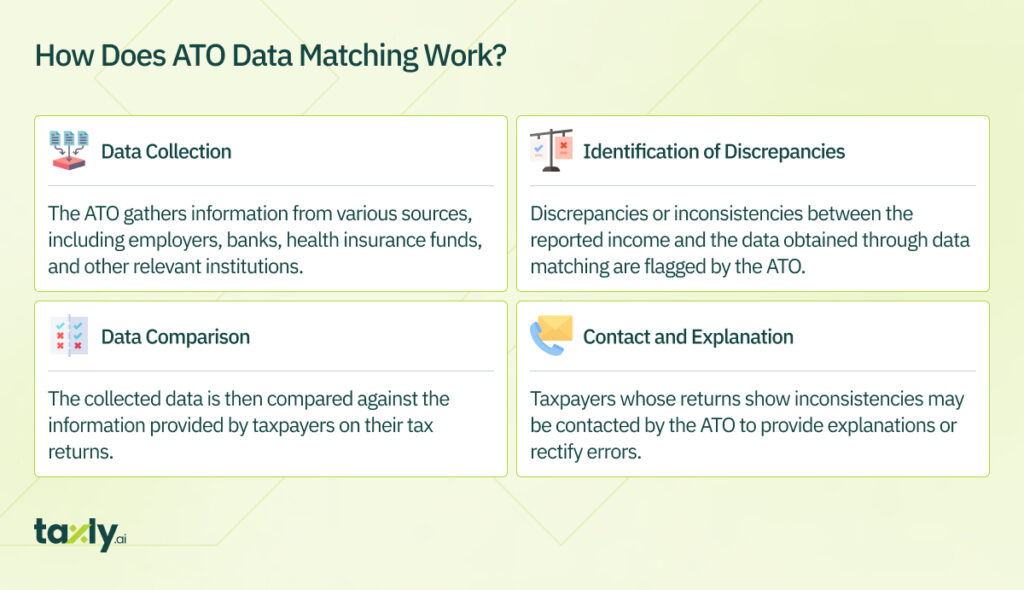ATO data matching is a process implemented by the Australian Taxation Office (ATO) to ensure taxpayers comply with their tax obligations accurately. This comprehensive guide will help you understand what ATO data matching is and how it may affect you.
What is ATO Data Matching?
ATO data matching is a sophisticated system utilized by the ATO to compare information provided by taxpayers on their tax returns with data obtained from various third-party sources. These sources include employers, financial institutions, health insurance funds, BAS statements, superannuation accounts, and more. By cross-referencing this data, the ATO aims to identify discrepancies or undeclared income, ensuring taxpayers fulfill their tax obligations accurately.
ATO Data Matching Principle
- Legal Compliance: Data matching activities must comply with relevant laws, regulations, and guidelines governing the collection, storage, use, and disclosure of personal and financial information. This includes adherence to privacy laws and regulations to protect the confidentiality and security of taxpayer data.
- Purpose Limitation: Data matching is conducted for specific purposes outlined by law or policy, such as identifying discrepancies in tax reporting, detecting tax fraud, ensuring compliance with tax laws, and recovering outstanding debts owed to the government.
- Transparency: The ATO aims to be transparent about its data matching practices, providing clear information to taxpayers about the purposes, methods, and sources of data used in data matching activities. Transparency helps build trust and confidence in the integrity of the tax system.
- Accuracy and Integrity: The ATO is committed to ensuring the accuracy, completeness, and integrity of the data used in data matching processes. This involves implementing quality assurance measures, data validation procedures, and safeguards to minimize errors and discrepancies.
- Proportionality: Data matching activities are proportionate to the objectives pursued, balancing the need for effective compliance and enforcement with the privacy rights and interests of individuals. The ATO seeks to minimize the impact on privacy while achieving its compliance objectives.
- Accountability: The ATO holds itself accountable for the responsible use of data and adherence to ethical standards in its data matching activities. This includes establishing mechanisms for oversight, review, and accountability to ensure compliance with data protection principles.
Why Does ATO Data Matching Matter?
Understanding ATO data matching is crucial as it helps taxpayers comprehend the importance of accurately reporting their income and financial transactions. Failure to declare all sources of income can result in penalties, fines, and back-payment of taxes.
- ATO data matching ensures that taxpayers accurately report their income and financial transactions, thereby improving overall tax compliance.
- ATO data matching promotes fairness and equity within the tax system, preventing individuals or businesses from gaining unfair advantages.
- ATO data matching helps safeguard government revenue by identifying tax fraud, evasion, or non-compliance, ensuring that funds are directed towards essential public services and infrastructure.
- Effective data matching instills trust and confidence in the tax system among taxpayers and the broader community, demonstrating the ATO’s commitment to enforcing tax laws fairly.
- ATO data matching facilitates more accurate tax assessments by cross-referencing information from multiple sources, reducing the likelihood of errors or discrepancies in tax reporting and assessment processes.
- Automation of data comparison and analysis streamlines compliance efforts, enabling the ATO to allocate resources more effectively and focus on high-risk areas of non-compliance.
- A proactive approach to identifying non-compliance allows the ATO to intervene promptly, minimizing the impact on revenue and taxpayer obligations while deterring future instances of non-compliance.
- The existence of ATO data matching programs acts as a deterrent against tax evasion and non-compliance, encouraging taxpayers to fulfill their obligations accurately and transparently.

Institutions are legally obligated to share taxpayer information with the ATO to ensure compliance with tax laws. This includes both domestic and international financial institutions.
How Does ATO Data Matching Affect Taxpayers?
- Taxpayers who fail to declare all sources of income risk detection and subsequent penalties.
- Additional income streams, such as those from rental properties or freelance work, must be accurately reported to avoid discrepancies.
- Taxpayers have the option of voluntary disclosure if they realize they have made errors on their tax returns.
The Bottomline:
Understanding ATO data matching is essential for taxpayers to fulfill their tax obligations accurately and avoid potential penalties. By ensuring full disclosure of income and financial transactions, taxpayers can maintain compliance with tax laws and contribute to the integrity of the tax system.
For more personalized advice regarding ATO data matching and its implications, taxpayers are encouraged to consult with tax professionals or accountants.


Comments are closed